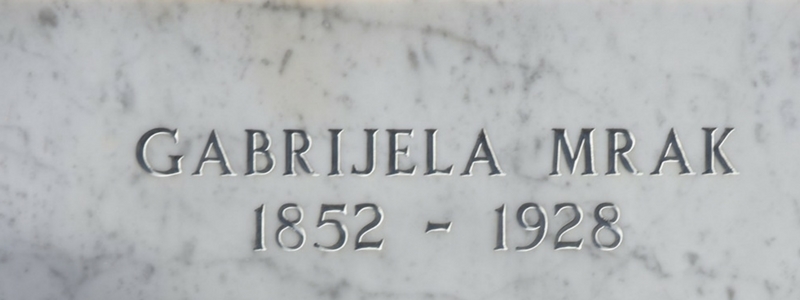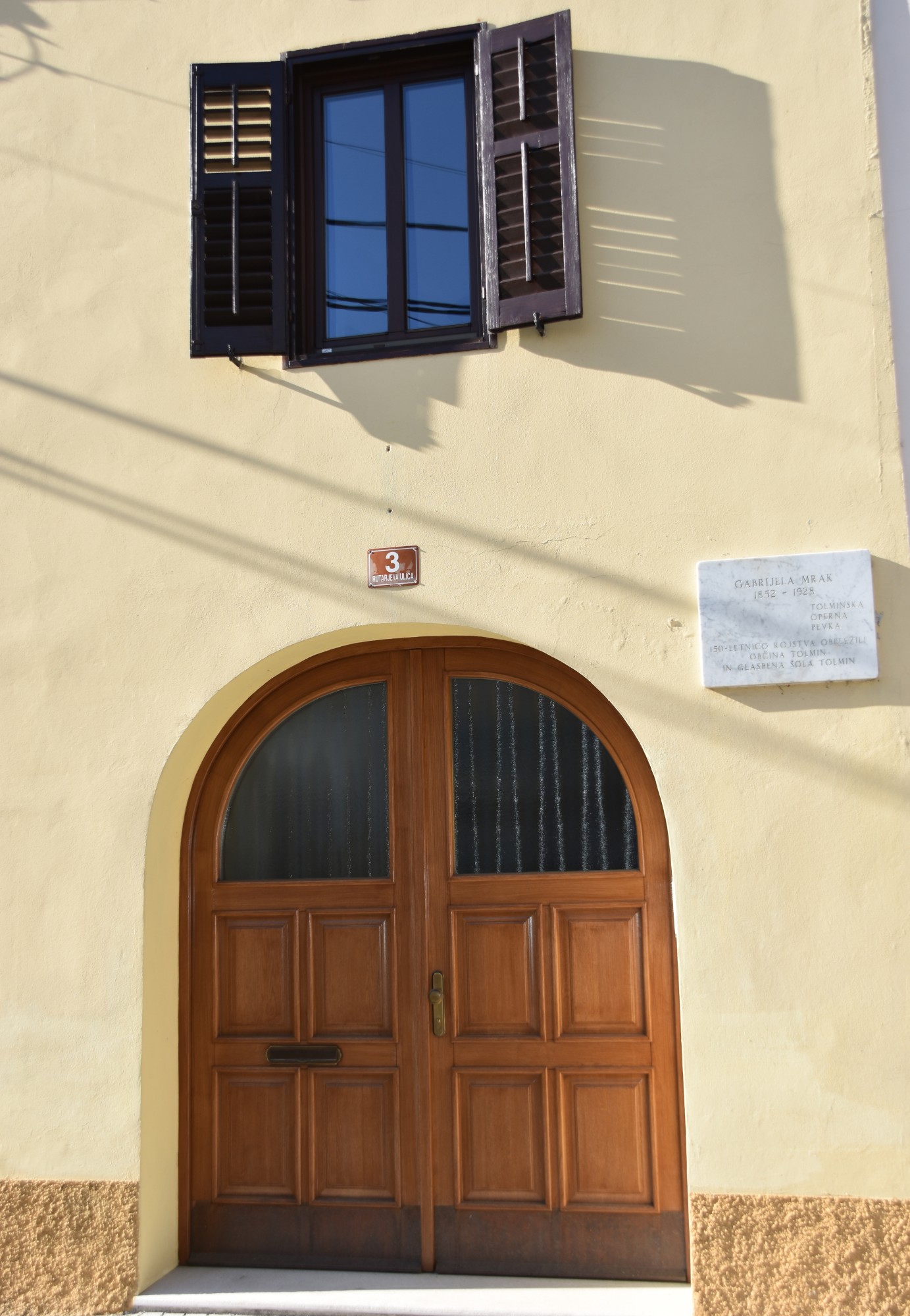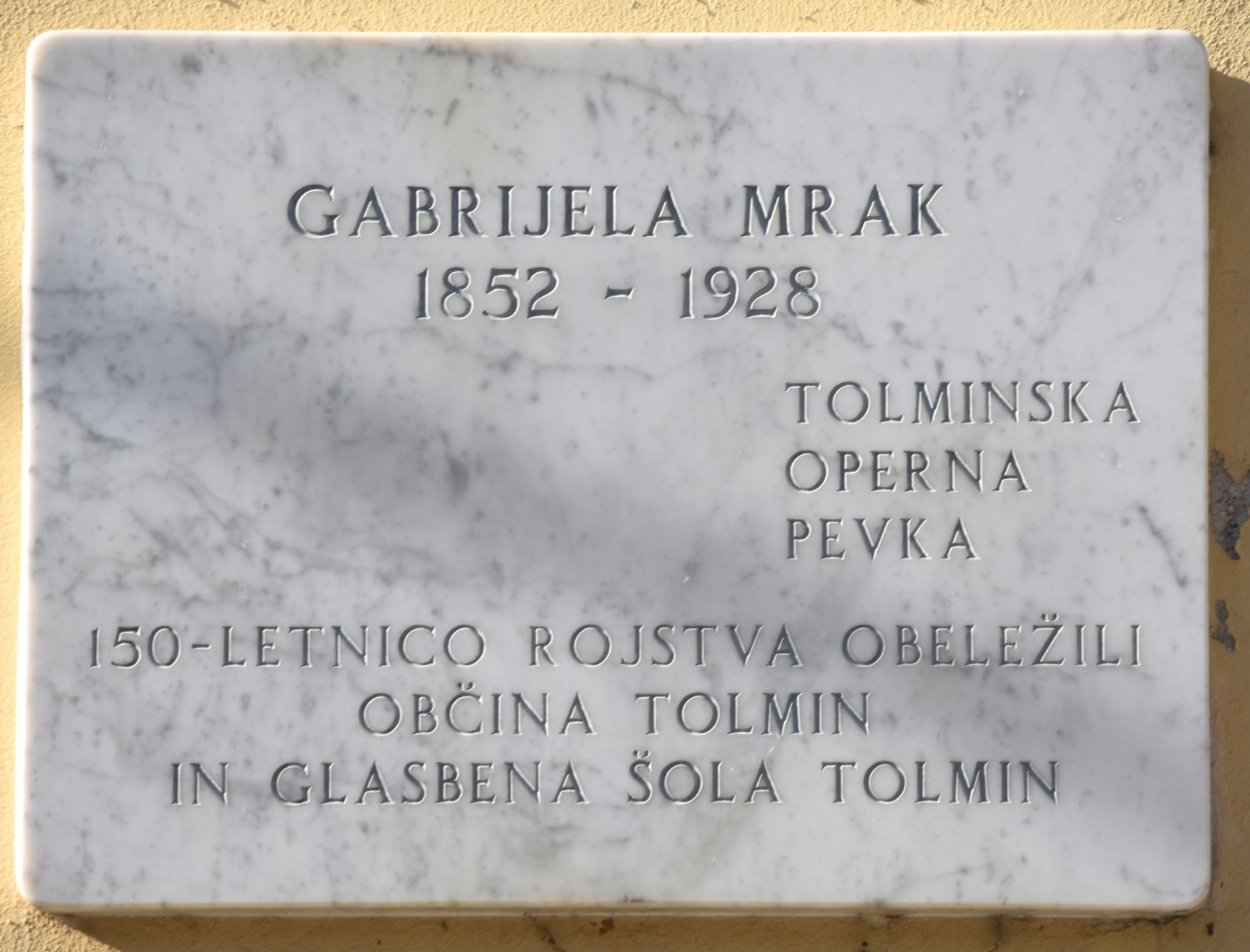The Municipality of Tolmin and Music School Tolmin had the plaque put up in 2002, on the 150th anniversary of the singer’s birth.
Gabrijela Mrak
Gabrijela Mrak (1852–1928) was an opera singer and educator from Tolmin. She carved out an illustrious international singing career that spanned all the way to opera venues in Vienna and beyond. Becoming a distinguished prima donna in the Regensburg opera company, Mrak achieved distinction as a consummate lyric soprano and formidable acting talent. Her professional path ended in Trieste with a teaching post.
Gabrijela Mrak was an illegitimate daughter of Ana Sfiligoj and Jakob Mrak. She grew up in Tolmin during the heyday of national reading rooms, cultural events of the 1860s that included evening recitations and singing in Slovenian. She performed in Graz before the age of 19 at various concerts that helped launch her international career. At one of these performances, Mrak captured the attention of the mother of the Austrian composer Wilhelm Kienzl, who took the talented young singer under her patronage and sponsored her singing studies with Carlo Caspari at the Graz conservatory. A record in a programme note concerning her advancement to a higher level in the first academic year testifies to her rapid progress.
In 1877, after graduating from the conservatory, Mrak debuted as a soprano soloist in Eggenberg and Graz. She performed together with the violin virtuoso and composer Richard Sahl and pianist Kathinka Phrym. In programming Sahl’s compositions, Mrak’s first solo recital boosted the recognition of the unknown composer. Mrak then performed in numerous venues around the Austro-Hungarian Empire and Germany, and built an illustrious and prolific career as an opera and operetta singer that spanned twenty years. Her mentor was Karoline Bauer, a German actress.
At the Graz Land Theatre, Mrak was cast in the role of Jemmy in Rossini’s William Tell, as Siébel in Gounod’s Faust, Urbain in Meyerbeer’s Les Huguenots and Pamina in Mozart’s The Magic Flute. The critics recognised in Mrak a promising lyric soprano with a good technical basis, and praised her acting talent, but drew the opera management’s attention to the fact that her voice was still developing and would attain its full potential only if her catalogue of roles was wisely chosen and, at least initially, not too demanding.
In the following opera season, Mrak was engaged by the Imperial-Royal and National Theatre in Innsbruck, where her prominent roles included Rosalinda and Pulcinella in Strauss’ Die Fledermaus and Prince Methuselah, Graziella in Genée’s The Royal Middy and Prince Raphael in Offenbach’s The Princess of Trebizonde. Positive reviews emphasised the quality and range of her “mellifluous” voice, whose lower volume and flair for recitative rendered it especially suited to operatic roles. Thus, through her vocal qualities as well as personal charm and modesty, Mrak won the favour of Innsbruck audiences, inspiring admiration and appreciation. At the end-of-season curtain call, she was showered with enthusiastic ovations, bouquets and a laurel wreath.
Gabrijela Mrak received offers of opera engagements from New York’s Thalia Theatre and from a St Petersburg theatre agency based in Berlin, but turned them down for unknown reasons despite promises of a substantial fee. In 1889, she declined an invitation from Milan and accepted only one-off engagements. She sang in Karlovy Vary, Teplice and Olomouc, Bohemia, and performed at the celebration marking the silver anniversary of Emperor Franz Josef I and Princess Elisabeth of Bavaria in Karlovy Vary.
The pivotal point in her artistic career was an engagement at the Regensburg Municipal Theatre, Bavaria, joining the ensemble for the 1882/83 and 1883/84 seasons. Cast in artistically substantial roles in masterpieces of the standard operatic repertoire, the years at Regensburg marked the climax of Mrak’s career. So tremendous was her popularity that she had to repeat arias during opera performances. She also performed for Maximilian Maria, Prince of Thurn und Taxis (who was patron of the Regensburg Theatre).
Leaving her native land as an adolescent girl, Gabrijela Mrak continued to return home, and performed in Tolmin and Gorizia. Primarily, she was member of the Carl-Theater, Germany, and sang in Slovakia, Hungary, Romania, Russia and Italy, and, towards the end of her singing career, also in Merano, Osijek and Varaždin. She shone in operetta parts, and showed an equally prodigious talent in more demanding roles, most notably as Santuzza in Mascagni’s Cavalleria Rusticana.
Maia Juvanc


